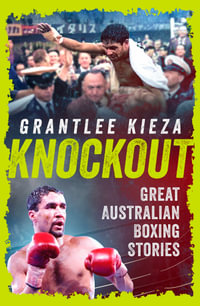
(Low)life
A Memoir of Jazz, Fight-Fixing, and The Mob
By: Charles Farrell
Hardcover | 1 July 2021 | Edition Number 1
At a Glance
Hardcover
RRP $49.99
$40.50
19%OFF
Aims to ship in 5 to 10 business days
When will this arrive by?
Enter delivery postcode to estimate
A self-admitted "fight-fixer" and "gangster, " but not a "tough guy," Farrell ran afoul of the actual tough guys in the 1990s, and fled to a farm in Puerto Rico, coming home only after an aging boxing legend brokered his safe return. Retired from the fight game, he returned to jazz and, among other collaborators, played frequently with his friend, Ornette Coleman, the godfather of "Free Jazz" and one of the greatest jazz musicians of the 20th century. (LOW)LIFE is a singular book by a singular man.
About the Author
Charles Farrell has spent his professional life moving between music and boxing, with occasional detours. He has managed five world champions, and has played and recorded with many of the musicians he most admires Evan Parker and Ornette Coleman among them. Farrell currently resides in the Boston, Massachusetts area.
Industry Reviews
"With deadpan humor, whip-smart insights and some damn fine sentences, Charles Farrell has written a classic chronicle of life in the twilight world, on par with masters of the genre like Damon Runyon, Mezz Mezzrow, Nat Hentoff and Nick Pileggi. A truly great read."--Debby Applegate, winner of the Pulitzer Prize for The Most Famous Man in America: The Biography of Henry Ward Beecher, and author of Madam: The Life of Polly Adler, Icon of the Jazz-Age
"To scrape the heavens with your art, to plunge into the sordors of the world with your business: not even Charles Farrell can explain Charles Farrell. But he's better qualified to try it than anybody else, and you owe it to yourself - I might even say it's your duty as an American - to experience (Low)life. Elegant, unexpected, seeking always the real behind the real, Farrell's prose hits like the precision fists of... blows like the wild trumpet of... I give up."--James Parker, The Atlantic
"This is a book people will be reading in years to come--like Claude Brown's Manchild in the Promised Land or Art Pepper's Straight Life or Jack Black's You Can't Win. I've devoured books about life on the margins since I was a kid, and I've read about as many of them as a human can get to, and I've never encountered a writer who knew that world as well as Charles Farrell and could match him for clear-eyed, unsentimental, shrewdly observed prose."--Carlo Rotella, author of Cut Time and The World Is Always Coming to an End
"(Low)life is a protean, impossible, brilliant memoir by an exquisitely unique observer. Charles Farrell's stories are fascinating, but it's his failures, his missed opportunities and blown bets that truly transcend into magical, enthralling, and uplifting territory (and where his writing shines the brightest.) For while Farrell has been so many things--professional pianist, fight-fixer, gangster--he has arrived here, later in life, as an emotional and deeply insightful writer, and his book is a gift of observation, a Henry Miller-esque odyssey through the murky bottom of Americana." --Sam Sheridan, author of The Fighter's Mind, A Fighter's Heart, and The Disaster Diaries, and creator of the TV series I Am The Night
"Every great boxing writer must understand boxing as a sport. But only those who have been artists can understand it as art, and only those who have been hustlers can understand it as a hustle. No one can interpret boxing like Charles Farrell, because no one has lived the life he has. This memoir shows why he is the best boxing writer in America."--Hamilton Nolan, boxing writer for Deadspin and HBO, editorial writer for the New York Times
"As an improvising pianist, Charles Farrell is a force of nature. His playing is at once a raging mountain stream during the spring thaw and the totally controlled and disciplined fury of a kung fu master in the midst of a battle to the death. His formidable technique is wholly subservient to his art: pure expressionism flowing like a conduit from beyond space and time. His music tells the story of his life in real time and it's a fascinating and gripping adventure."--Russ Lossing, critically-acclaimed jazz pianist and composer
"Charles Farrell's extraordinary, at times terrifying adventures in the worlds of boxing and jazz make for a compelling memoir. This is a book so exceptionally accessible and energized that you will power through it--even if you don't like boxing or jazz. And if you're curious about whether Sonny Liston threw the first Ali fight, or what it was like to play with Ornette Coleman while your fingers bled on the piano keys, you won't be able to put down (Low)Life."--Bill Littlefield, Editor of The Top of His Game: The Best Sportswriting of W.C. Heinz (Library of America, 2015)
"Jazz pianist. Boxing manager. Fight fixer. Charles Farrell seems to have lived a hundred lifetimes in just this one. (Low)life is a uniquely American memoir packed with keenly-observed scrapes and difficult, often painful, decisions."-- Ryan Gattis, author of All Involved and The System
"Farrell is an insider in a world that few know; his experiences, particularly as a musician, are revealing, and he insightfully relays the frustrations of a talented artist stymied by his surroundings, his choices, and, on occasion, circumstances beyond his control."--Library Journal
ISBN: 9781949590197
ISBN-10: 1949590194
Published: 1st July 2021
Format: Hardcover
Language: English
Number of Pages: 312
Audience: General Adult
Publisher: Hamilcar Publications
Country of Publication: US
Edition Number: 1
Edition Type: New edition
Dimensions (cm): 23.7 x 16.2 x 3.3
Weight (kg): 0.68
Shipping
| Standard Shipping | Express Shipping | |
|---|---|---|
| Metro postcodes: | $9.99 | $14.95 |
| Regional postcodes: | $9.99 | $14.95 |
| Rural postcodes: | $9.99 | $14.95 |
How to return your order
At Booktopia, we offer hassle-free returns in accordance with our returns policy. If you wish to return an item, please get in touch with Booktopia Customer Care.
Additional postage charges may be applicable.
Defective items
If there is a problem with any of the items received for your order then the Booktopia Customer Care team is ready to assist you.
For more info please visit our Help Centre.
You Can Find This Book In
This product is categorised by
- Non-FictionBiographies & True Stories BiographiesArts & Entertainment Biographies
- Non-FictionBiographies & True Stories BiographiesSport Biographies
- Non-FictionSports & RecreationCombat Sports & Self-DefenceBoxing
- Non-FictionBiographies & True Stories True StoriesTrue Crime
- Non-FictionArts & EntertainmentMusicMusic Styles & GenresJazz























